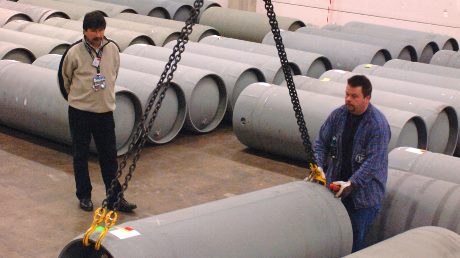The International Atomic Energy Agency (IAEA) Board of Governors has approved two agreements enabling the agency to move to full-scale implementation of its proposed low-enriched uranium (LEU) 'fuel bank' in Kazakhstan.
 |
| LEU will be stored in cylinders at the Ulba plant (Image: D Calma/IAEA) |
The board approved a host state agreement between the IAEA and Kazakhstan, covering the establishment of the facility to be hosted at the Ulba Metallurgical Plant in north-eastern Kazakhstan, and a transit agreement with the Russian Federation to permit the transport of IAEA LEU to and from the bank through its territory.
IAEA Director General Yukiya Amano said the conclusion of the agreements and their approval represented a "significant milestone" for the project, enabling it to proceed to full-scale implementation.
The repository, which the agency is referring to as the IAEA LEU Bank, is intended to provide an assurance of supply mechanism of last resort. Owned and controlled by the IAEA but operated by Kazakhstan, the bank's safety and security will be governed by Kazakhstan's legal and regulatory requirements. It must also comply with applicable IAEA safety standards and security guidance, and will be subject to IAEA safeguards.
The facility will be a physical reserve of up to 90 tonnes of LEU, available to IAEA member states should they find themselves unable to obtain LEU on the commercial market. Members requesting LEU from the bank must meet a set of criteria approved by the IAEA's board: the member's supply of LEU must be disrupted; the state must be unable to secure LEU from the commercial market, state-to-state agreements or other such means; and the state must have in place, and be in compliance with, a comprehensive safeguards agreement with the IAEA.
A key principle of the bank is that it must not distort the open market. Once a state has agreed to a supply agreement with the IAEA, it must pay the full cost of re-stocking the LEU stored in the bank. On receipt of the payment, the cylinders of LEU will be shipped from the UMP site and transferred to a facility where it can be made into fuel. It cannot be further enriched, processed, retransferred or re-exported without IAEA agreement.
The IAEA LEU Bank is fully funded by voluntary contributions including $50 million from the US-based Nuclear Threat Initiative (NTI) organization, $49 million from the USA, up to $25 million from the European Union, $10 million each from Kuwait and the United Arab Emirates and $5 million from Norway.
The bank's existence does not affect the rights of IAEA member states to develop their own nuclear fuel cycle facilities, but the NTI's support for the project reflects that organization's commitment to reducing the risks of nuclear proliferation, as highlighted by NTI co-chairman and former US senator Sam Nunn. "If the dozens of countries interested in nuclear energy also choose to pursue uranium enrichment, the risk of proliferation of dangerous nuclear materials and weapons would grow beyond the tipping point", he said. "The IAEA LEU Bank now gives countries an alternative to that choice and direction."
Nunn thanked the funding partners and NTI advisor Warren Buffett, who financially backed NTI's $50 million commitment made in 2006 on condition that the IAEA received a further $100 million in matched funds. "We are also appreciative of the leadership shown by the IAEA and its Board of Governors and the government of Kazakhstan and President Nursultan Nazarbayev," he said.
The IAEA LEU Bank is one of several global efforts to create an assured supply of nuclear fuel. Other assurance of supply mechanisms, established with IAEA approval, include a guaranteed physical reserve of LEU maintained by Russia at the International Uranium Enrichment Centre in Angarsk, and a UK assurance of supply guarantee for supplies of LEU enrichment services. The USA also operates its own LEU reserve.
The formal signature of the host-state agreement by the IAEA and Kazakhstan is expected in late August. NTI anticipates that the facility will become fully operational in 2017.
Researched and written
by World Nuclear News




_23009.jpg)
_53504.jpg)

_13505.jpg)






